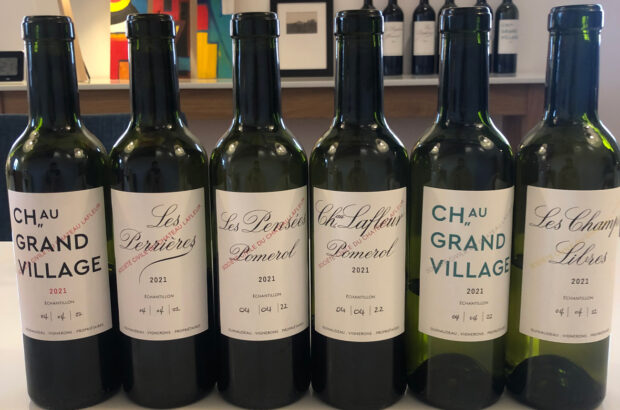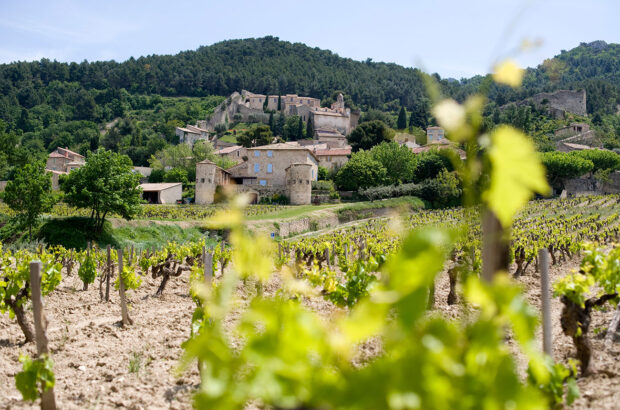If the Goethe Institute had been closer, everything could have been different.
‘My parents-in-law had forbidden me to leave the house without their permission, and never on my own,’ Namratha Prashanth says.
‘I had to take my husband even to see my parents. I needed something to keep my sanity and learning a new language seemed like a good option. I’d always wanted to speak German, but the Alliance Française was closer to where we lived. I could get out and back within two hours while they were out of the house, so I took French classes instead’.
Namratha is telling me this while we are sitting in my kitchen discussing her new wine, Solicantus, a Blaye Côtes de Bordeaux made in partnership with fourth generation French winemaker Corinne Chevrier of Château Bel-Air La Royère.
The wine launched in March 2020, two weeks before the whole of France went into lockdown, and only now is the planned marketing campaign able to swing into action.
Scroll down for Jane Anson’s Solicantus tasting note and score
It’s an enjoyable Merlot-dominated Right Bank red, but it’s quite clear that the real story is Namratha herself.
She moved to Bordeaux from Bangalore in 2017, first to study an MBA in wine marketing at INSEEC university, and is now a brand owner launching her first label.
And much like learning French, Solicantus came about because of her willingness to look elsewhere, and to flex that essential muscle of all entrepreneurs – an ability to pivot.
‘When I finished up at INSEEC in Autumn 2018, I sent out over 100 job applications to châteaux and négociants’, she says. ‘I didn’t receive even one reply, let alone an interview request’.
The rejection letters were particularly tough because she knew that her visa depended on her having a job.
Bangalore is the capital of Karnataka in southern India, with a population of more than eight million. It’s the centre of India’s high-tech industry, but it would not have been easy to find work in a local wine industry that remains resistant to women, despite increasing numbers of female wine drinkers in the country.
That’s not to say it would have been impossible; just ask the brilliant Sonal Holland MW, founder of the India Wine Awards. I suggest watching her fascinating TedX talk.
But for Namratha, it would also have meant returning to the city where her estranged husband lived. At the time she was still waiting for him to agree to a divorce despite her leaving him in 2016, aged 37, 12 years into a marriage that had become violent, and that had been overshadowed by the demands of his extremely traditional family.

Namratha Prashanth.
‘We married the same year as I graduated from a business degree in hospitality management,’ she says, backing up. ‘A few months before the wedding his parents put forward a condition that I could marry only if I agreed to be a stay-at-home daughter-in-law.
‘Eventually I went ahead, but things didn’t go as I had imagined. His family was large, with complex personalities, and we all lived together in his parents’ house. To the outside world I had a perfect life. For me, I was their slave.’
She continues, ‘I tried to get financially independent by running a small home baking business, which worked for a while, until I had our daughter Shloka. Over time my husband turned abusive, something that increased when I eventually found work outside the home.
‘The pressure didn’t end, and I eventually I quit my job and promised to give our marriage a fresh chance after counselling. It worked for six months. I finally found a job with LinkedIn India as a customer advocate on a good salary, but the night before I started, my husband again turned violent and broke everything in the house that belonged to me, including a work laptop that I had just been given.
‘The managers were sympathetic and I kept my job, but at this point I moved to my parents’ home along with my nine-year-old daughter. I wasn’t earning enough to live independently, to pay rent, support my child. Indian society wouldn’t accept a divorcee that easily, and the process would take time; two years to get maintenance and about seven years of battle in court for the divorce as it wasn’t agreed to by both parties.
‘My husband and his family were pressuring me to go back, and I was getting desperate. In the end, my sister and her husband suggested that I move to a different country and study further. I had been to Paris for a training course with my company a few years earlier, and I could speak French. I looked online and found the INSEEC course and thought, why not wine? My parents pledged to support me, and I left my daughter in their care.’
She went first to Singapore for a course with the Wine & Spirit and Education Trust (WSET), and then moved to Bordeaux.
Adding up the dates, Namratha must be in her early 40s but looks way younger. She’s open in talking about her past, and is extremely charming yet is clearly armed with cast iron reserves of determination.
She had spent five months earlier in her wine MBA working as an intern at Château Siran in Margaux, where she says the ’80 hectares of peace’ gave her back a sense of normality that she had almost forgotten. But in the absence of any permanent job offers in Bordeaux, she started contacting investment companies in the UK.
‘I had started exploring [the] world of investment wine while at Siran in the evenings on my own, looking at how to attract clients from India,’ she says. ‘My brother in law works in investment in Bangalore, and together we set up a company and began working with Cult Wines in London.
‘But India is still not a culture that has high levels of wine investment. If they do it is certainly Bordeaux they are interested in, but taxes are extremely high to repatriate any purchases – on average 160% import tax and regional duties of up to 500%. It’s possible but complicated.
‘And anyway, wine is global. It’s about selling happiness, selling to everyone. I never wanted to concentrate solely on Asia simply because of where I am from. Then one of our clients asked me about possibility of buying a vineyard for them, and it made me think about creating my own brand.’
Which brings us back to the bottle of wine sat between us in my kitchen in Bordeaux, with its striking black and red label. ‘I met Corinne by chance at Vinexpo, just walking past her stand and starting to chat. One month later I visited her at her estate. We walked through the vineyard as she explained that the growing season is like a pregnancy and harvest like delivering a child. We laughed. We got on very well. I asked if I could learn about the practical side of winemaking from her and she agreed.
She says, ‘We were working on five hectares together, and together we decided to use some of the grapes to bring out a separate label. I was working on branding for another client at the time, and I had gathered enough experience. I decided to go ahead and create my own brand.’
Her ‘talent passport’ business visa came through in late 2019 and her company Wine Equation was born, concentrating on limited bottlings – of which Solicantus is the first.
It might not be easy. Blaye is hardly the most high-profile appellation from which to launch a wine brand, and although the wine industry in Bordeaux is changing, female brand owners – let alone ones who are not born with a Rolodex of local contacts – remain maddeningly rare.
As Namratha says, ‘The hardest thing has been having people take me seriously.’
Personally, I wouldn’t underestimate the potential of Wine Equation. Already 30 cents of every bottle sold is being put aside to help fund female education in India.
The difficulty of travelling in 2020, she tells me, has put the project back from her initial plans to launch the charity at the same time as the wine. And in a similar vein, had Covid not intervened, her daughter would be starting school in Bordeaux this month. I have a feeling her mother will find a way to get her here soon.







